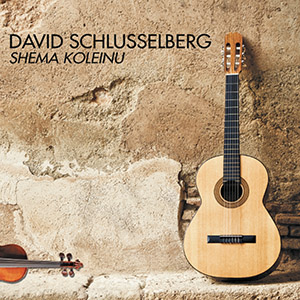

Rabbi David Schlusselberg, rebbe at the Rae Kushner Yeshiva High School in Livingston, is more than just an instructor to his students. According to recent graduates he is a mentor, friend and inspiration.
“Rabbi Schluss (as he is affectionately known) might be the best Judaic teacher I ever had. He makes everything he teaches come alive and teaches on a level that we can all relate to. Plus, he’s just a great guy,” said RKYHS alumnus and current Bar Ilan Israel XP student Joey Kirsch.
It appears that Rabbi Schlusselberg is more than just a high school rebbe also. On the heels of his successful 2014 album “Mizmor L’Dovid,” the musically-inclined and -talented Schlusselberg recently released his second album entitled “Shema Koleinu.” This album is a collection of ten niggunim composed by Schlusselberg during the month of Elul.
“Though these songs were written for my personal relationship with my Creator, it is my hope that by listening to this album you too will become inspired to draw closer to the Ribono Shel Olam,” wrote Schlusselberg inside the CD cover.
The niggunim are all performed by Schlusselberg on either the guitar, mandolin, cello or violin, with Jake Antelis accompanying on percussion.
When asked from where he got the inspiration for his music, Schusselberg stated, “In mid-August I was sitting in my car listening to a shiur from Rabbi Aryeh Lebowitz entitled ‘Setting Pesukim and Ma’amarei Chazal to Music,’ where he quotes a sefer Orchot Rabbeinu (vol. 1 pg. 37) where Rabbi Yaakov Yisrael Kanievsky states that singing pesukim helps give people a greater sense of awe for God. After hearing that line, a lightbulb went off in my head. As a Jewish musician, a strong internal desire came over me to want to write spiritually geared music to help people get closer to God. Although I had already recorded an album of Jewish music, this type of inspirational and spiritual music was missing from most of the music I had been writing.”
Schlusselberg continued, “A few days later I still hadn’t done anything with the epiphany that came over me a few days earlier. That night, I attended a shiur from my rabbi, Rabbi Moshe Tzvi Weinberg, entitled ‘Don’t Delay! Taking Full Advantage of the Opportunity of Teshuvah.’ Throughout the shiur, Rabbi Weinberg spoke about how when a person has a desire to strengthen his or her relationship with God, they should put that feeling into action. When I returned home that night, the lesson I took from the shiur was to strengthen my personal relationship with God through the medium of music. I thought back to a few days earlier, and remembered how I had a strong desire to write Jewish music that helps bring people closer to God, and here I was in the Jewish month of Elul where I wanted to write music to strengthen my personal relationship with God, and record this music, which in turn will hopefully help others strengthen their relationships as well. I know that God was on board with my plan, because what occurred that night (and over the subsequent month) was only possible with tremendous divine help. I pulled out my guitar, and I began to play. Within a few minutes I found myself playing a series of chords as I began humming a melody. Within approximately 25 minutes or so I had composed the first song for the CD, appropriately entitled ‘The Teshuva Niggun.’”
Within the next two days Schlusselberg had composed four songs for the new CD. He contacted Jake Antelis, with whom he had recorded his first album, and scheduled recording sessions for the following week. He spent that weekend composing cello, violin and mandolin parts to those four songs and when Monday morning arrived he felt confident in his music. Over the subsequent three weeks a pattern developed whereby he would compose the guitar and melody, schedule a recording session, compose the other instrumentation and, finally, record the song(s). By erev Rosh Hashanah he had finished all ten songs for the album, and had eight of them recorded.
As 5775 waned, Schlusselberg felt satisfied that the last few weeks he had spent writing music would truly help rebuild his relationship with God, thereby helping others do the same.
The name of the album, “Shema Koleinu” (hear our words), came from the title of one of the singles on the album, which includes seven songs with words and three songs with melodies only, and a balance of fast and slow songs. The album is currently available for purchase at the Teaneck Judaica House, Rae Kushner Yeshiva High School, and digitally on iTunes and other online music venues.
Schlusselberg can be reached at [email protected].
By Jill Kirsch










